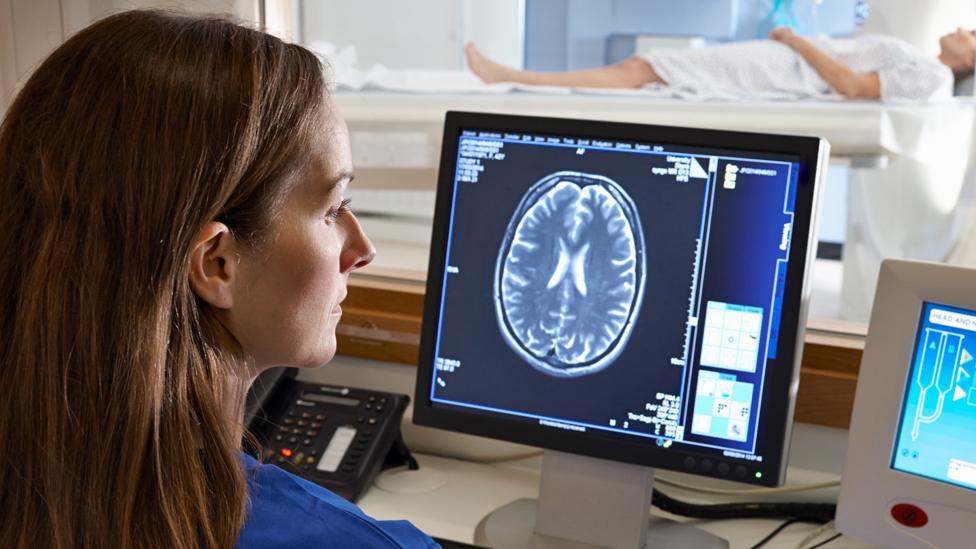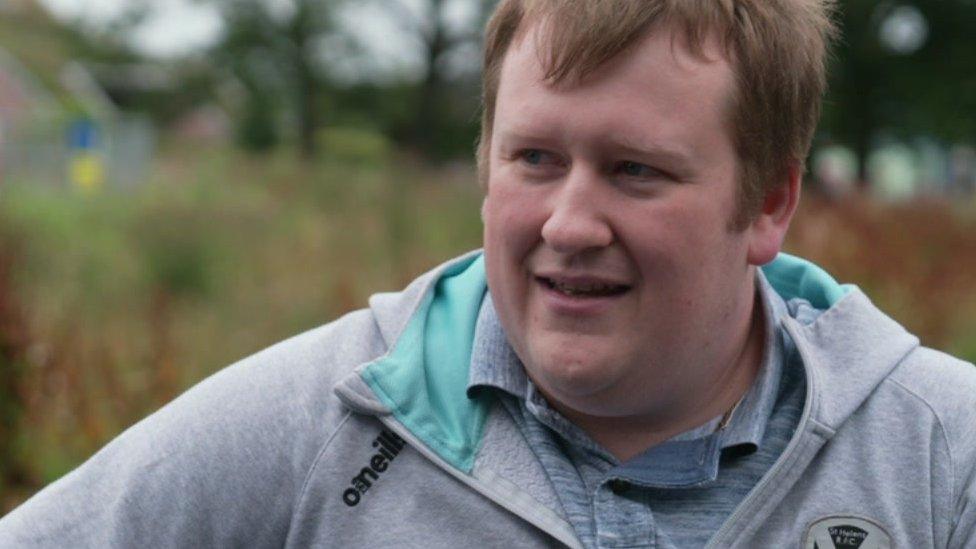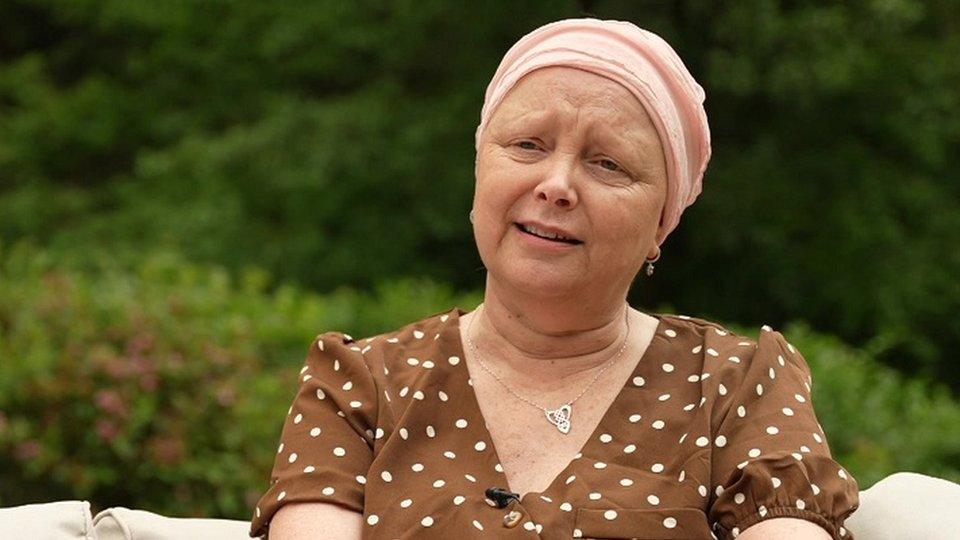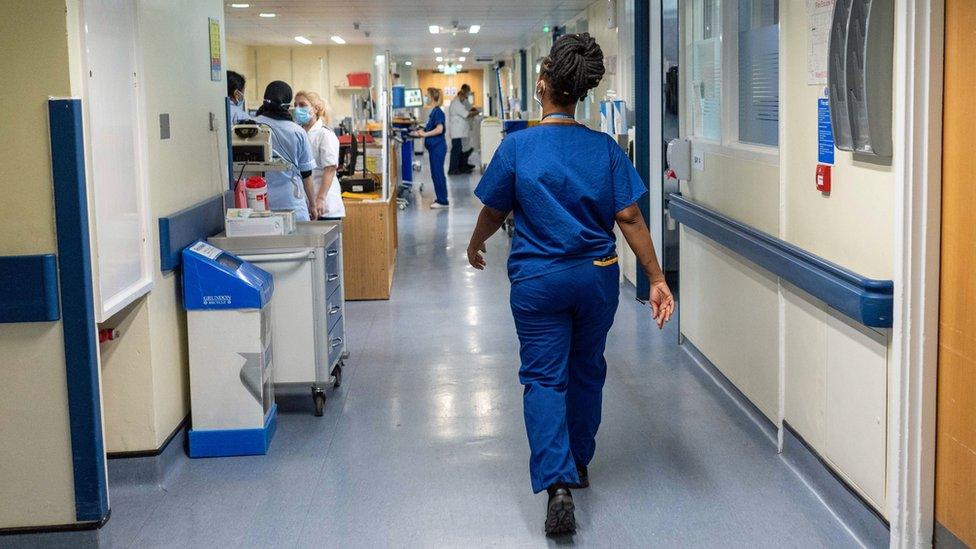Radiographers begin 48-hour strike in England
- Published

Radiographers, who perform vital scans on patients, begin a 48-hour strike at 08:00 on Tuesday in parts of England.
Staff at 37 NHS trusts are staging walkouts over pay.
The government says its offer of a 5% pay rise combined with one-off payments totalling at least £1,655 is "reasonable" and "final".
Patients can expect disruption to services - but staffing levels akin to those during bank holidays will provide "life and limb" emergency cover.
The Society of Radiographers said nine out of every 10 NHS patients were supported by radiographers, who perform X-rays, magnetic resonance imaging (MRI) and computerised-tomography (CT) scans, ultrasounds and breast screening, as well as radiotherapy for cancer patients.
A million patients are awaiting scans, it says, contributing to the backlog of more than 7 million people who are waiting for planned NHS treatment.
Anyone needing urgent medical care should come forward as normal, especially in emergency and life-threatening situations if seriously ill or injured.
NHS medical director for secondary care Dr Vin Diwakar said: "People should continue to use the NHS as they usually would and attend their appointments as normal, unless they have been informed it has been rearranged."
Job pressures
John Kelly told BBC News he was striking over morale and job pressures, as well as pay.
"We see the care we are wanting to give to patients decreasing in quality, because we haven't got the time or the availability," he said.
"There's a huge amount of pressure. Obviously nine out of 10 patients that come through the NHS through our doors are going to be seeing a radiographer at some point during their journey.
"With seven million people on the waiting list, it's absolutely massive that we need to get these people treated, diagnosed. We need to work as fast as possible."

NHS radiographer John Kelly told BBC News he was striking over morale and job pressures, as well as pay
It takes years to become a radiographer. People need a degree or postgraduate qualification and can then expect to earn between around £28,500 and £42,600 a year, depending on experience and how long they have been in the role.
Trusts with walkouts include:
Airedale NHS Foundation Trust
Alder Hey Children's NHS Foundation Trust
Berkshire Healthcare NHS Foundation Trust
Croydon Health Services NHS Trust
Dorset HealthCare University NHS Foundation Trust
East Suffolk and North Essex NHS Foundation Trust
Great Ormond Street Hospital for Children NHS Foundation Trust
Great Western Hospitals NHS Foundation Trust
Hampshire Hospitals NHS Foundation Trust
Kent Community Health NHS Foundation Trust
King's College Hospital NHS Foundation Trust
Liverpool University Hospitals NHS Foundation Trust
Mersey and West Lancashire Teaching Hospitals NHS Trust
Nottingham University Hospitals NHS Trust
Queen Victoria Hospital NHS Foundation Trust
Rotherham Doncaster and South Humber NHS Foundation Trust
Royal Papworth Hospital NHS Foundation Trust
Royal Surrey NHS Foundation Trust
Royal United Hospitals Bath NHS Foundation Trust
Sheffield Children's NHS Foundation Trust
Sheffield Teaching Hospitals NHS Foundation Trust
Solent NHS Trust
South Westminster Centre for Health
Southern Health NHS Foundation Trust
St George's University Hospitals NHS Foundation Trust
The Clatterbridge Cancer Centre NHS Foundation Trust
The Royal Marsden NHS Foundation Trust
The Walton Centre NHS Foundation Trust
Torbay and South Devon NHS Foundation Trust
University College London Hospitals NHS Foundation Trust
University Hospital Southampton NHS Foundation Trust
University Hospitals Bristol and Weston NHS Foundation Trust
University Hospitals Plymouth NHS Trust
University Hospitals Sussex NHS Foundation Trust
West Hertfordshire Teaching Hospitals NHS Trust
Whittington Health NHS Trust
Wye Valley NHS Trust
More than 20,000 Society of Radiographers members were balloted.
Dean Rogers, from the Society of Radiographers, said: "Voting for strike action was a difficult decision for our members, who care above all about the safety and wellbeing of their patients.
"We need to draw attention to the fact that many radiography professionals are feeling burnt out by low pay and increased hours. They're leaving the NHS, and they are not being replaced in adequate numbers.
"If the government wants to reduce NHS waiting lists and ensure that patients receive the treatment they need, when they need it, then it must urgently prioritise the recruitment and retention of radiography professionals - and that means talking to us about pay and conditions."
Health and Social Care Secretary Steve Barclay said: "I want to see an end to disruptive strikes so the NHS can focus relentlessly on cutting waiting lists and delivering for patients.
"The majority of unions on the NHS Staff Council voted to accept the government's fair and reasonable offer of a 5% pay rise for 2023-24, alongside two significant one-off payments totalling at least £1,655, putting more money in their pockets now.
"Over a million NHS staff, including radiographers, are already benefiting from that pay rise. The NHS also recently published the first ever NHS Long Term Workforce Plan, to recruit and retain hundreds of thousands more staff."

Are you a radiographer with a view on the strike? Are you a patient affected? You can share your experiences by emailing haveyoursay@bbc.co.uk, external.
Please include a contact number if you are willing to speak to a BBC journalist. You can also get in touch in the following ways:
WhatsApp: +44 7756 165803
Tweet: @BBC_HaveYourSay, external
Please read our terms & conditions and privacy policy
If you are reading this page and can't see the form you will need to visit the mobile version of the BBC website to submit your question or comment or you can email us at HaveYourSay@bbc.co.uk, external. Please include your name, age and location with any submission.
Related topics
- Published8 June 2023

- Published28 June 2023
